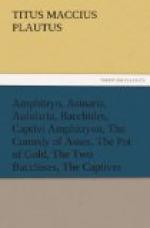Mnes.
Quid scribam?
Write what?
Chrys.
Salutem tuo patri verbis tuis.
Oh, some wish—use
your own words—for your father’s health.
(Mnesilochus
writes)
Pistoc.
Quid si potius morbum mortem scribat? id erit rectius.
Hadn’t he
better write sickness and death? That will be
more
to the point.
Chrys.
Ne interturba.
(to Pistoclerus) Don’t muddle him.
Mnes.
Iam imperatum in cera inest.
That’s down now according to orders.
Chrys.
Dic quem ad modum.
Let’s hear how you’ve put it.
Mnes.
“Mnesilochus salutem dicit suo patri.”
(reading) “Mnesilochus sends best wishes to his father.”
Chrys.
Adscribe hoc cito:
“Chrysalus mihi usque quaque loquitur
nec recte, pater,
quia tibi aurum reddidi et quia non te
fraudaverim.”
Hurry up, add
this: “Chrysalus keeps talking away at me
everywhere, father,
and talking harshly, because I handed
the gold over
to you and did not defraud you.”
Pistoc.
Mane dum scribit.
Give him time to write.
Chrys.
Celerem oportet esse amatoris manum.
A lover’s hand ought to be nimble.
Pistoc.
[21]At quidem hercle est ad perdundum magis quam ad scribundum cita.
Gad, yes! but
it makes shorter work of cash than
correspondence.
Mnes.
Loquere. hoc scriptumst.
Go on. That’s written.
Chrys.
“Nunc, pater mi, proin tu ab eo
ut caveas tibi,
sycophantias componit, aurum ut abs ted
auferat; 740
et profecto se ablaturum dixit.”
plane adscribito.
“Now then,
father dear, do be on your guard against him—he
is laying a rascally
scheme to take the gold from you; and
he vows he will
take it.” Write that down plain.
Mnes.
Dic modo.
(after a moment) Yes, yes, go on.
Chrys.
“Atque id pollicetur se daturum
aurum mihi,
quod dem scortis quodque in lustris comedim
congraecem, pater,
sed, pater, vide ne tibi hodie verba det:
quaeso cave.”
“And besides, he promises he will give it to me to spend on women and to squander in riotous living in low resorts, father. But, father, do see that he doesn’t impose upon you to-day: for mercy’s sake, take care.”
Mnes.
Loquere porro.
(finishing) All right, some more.




